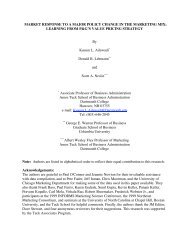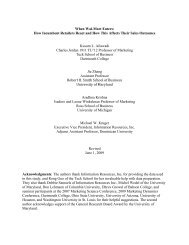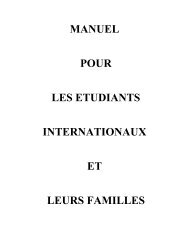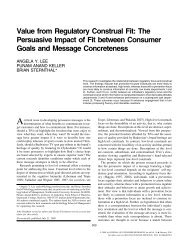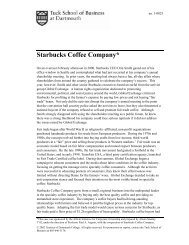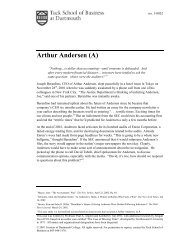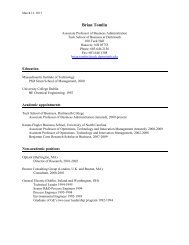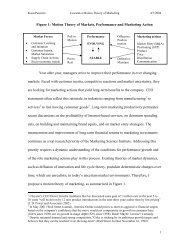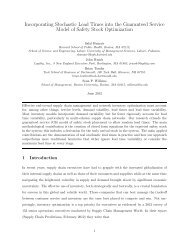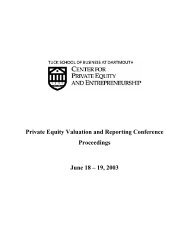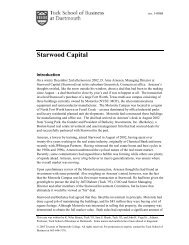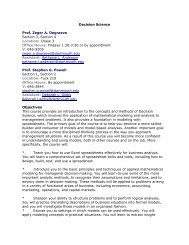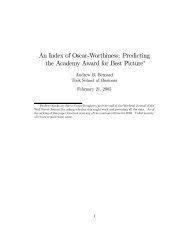tax notes international - Tuck School of Business - Dartmouth College
tax notes international - Tuck School of Business - Dartmouth College
tax notes international - Tuck School of Business - Dartmouth College
You also want an ePaper? Increase the reach of your titles
YUMPU automatically turns print PDFs into web optimized ePapers that Google loves.
INDIA<br />
Addressing the assessee’s deduction <strong>of</strong> the salary<br />
costs <strong>of</strong> some employees in its head <strong>of</strong>fice, the <strong>tax</strong> <strong>of</strong>ficer<br />
said those costs were in the nature <strong>of</strong> head <strong>of</strong>fice<br />
expenses, which are subject to a deductibility cap under<br />
section 44C <strong>of</strong> the Indian Income Tax Act. 2 Subjecting<br />
it to that limit, the <strong>tax</strong> <strong>of</strong>ficer denied the deduction.<br />
The assessee successfully argued its case before the<br />
commissioner <strong>of</strong> income <strong>tax</strong> (appeals). The Revenue<br />
Department then appealed to the tribunal.<br />
Tribunal’s Ruling<br />
The tribunal held that the Malaysian company did<br />
not have a PE in India under article 5(4)(a) <strong>of</strong> the<br />
India-Malaysia <strong>tax</strong> treaty. It noted that the personnel<br />
supplied by the Malaysian company were under the<br />
direct control <strong>of</strong> the assessee, that the Malaysian company<br />
had no further role after the personnel were supplied<br />
to the assessee, and that the Malaysian company<br />
did not carry out any direct supervisory activities in<br />
India.<br />
Also, the tribunal noted that there is no article in<br />
the India-Malaysia <strong>tax</strong> treaty that deals specifically<br />
with fees for technical services. Consequently, there<br />
was no obligation on the assessee to withhold Indian<br />
<strong>tax</strong> from the payments it made to the Malaysian company<br />
and the payments were therefore <strong>tax</strong> deductible.<br />
The tribunal also noted that article 5(2)(j) <strong>of</strong> its <strong>tax</strong><br />
treaties, which provides for a threshold <strong>of</strong> six months<br />
in India, specifically refers to a building site, installation,<br />
or assembly project, or supervisory activities in<br />
connection therewith.<br />
Turning to the assessee’s payments to the U.K. company,<br />
the tribunal noted that, in contrast to article<br />
5(2)(j), a PE is triggered under article 5(2)(k) when services,<br />
including managerial services, are performed in<br />
India for an unrelated party for a period <strong>of</strong> more than<br />
90 days in any 12-month period.<br />
The tribunal therefore applied the settled legal principle<br />
that if two provisions are equally applicable to a<br />
situation, the one that is most beneficial to the <strong>tax</strong>payer<br />
should be adopted. Because the personnel <strong>of</strong> the<br />
U.K. company were deployed in India for no more<br />
than 135 days, there was no PE for the U.K. company<br />
under article 5(2)(j) <strong>of</strong> the India-U.K. <strong>tax</strong> treaty. Consequently,<br />
the assessee was not required to withhold any<br />
Indian <strong>tax</strong> from its payments to the U.K. company and<br />
the payments were therefore <strong>tax</strong> deductible.<br />
Regarding the services supplied by the Dutch company,<br />
the tribunal held that those services, while tech-<br />
2 ITA section 44C limits the deduction for head <strong>of</strong>fice expenses<br />
to 5 percent <strong>of</strong> <strong>tax</strong>able income, computed as specified.<br />
Head <strong>of</strong>fice expenses have been defined to mean executive and<br />
general administrative expenditures incurred by the assessee outside<br />
<strong>of</strong> India, including salaries, rent, travel expenses, and so on.<br />
nical, did not make any technical knowledge or experience<br />
available to the assessee. As such, the assessee’s<br />
payments to the Dutch company could not be classified<br />
as fees for technical services within the meaning <strong>of</strong><br />
article 12 <strong>of</strong> the India-Netherlands <strong>tax</strong> treaty, the tribunal<br />
said. The assessee therefore was not required to<br />
withhold any Indian <strong>tax</strong> from the payments, and the<br />
payments were <strong>tax</strong> deductible, the tribunal ruled.<br />
On the final question, the tribunal held that the deductibility<br />
cap on head <strong>of</strong>fice expenses is limited to<br />
executive and general administrative expenses incurred<br />
by the head <strong>of</strong>fice for a common purpose — for example,<br />
for purposes <strong>of</strong> managing the head <strong>of</strong>fice as<br />
well as all branches and PEs in general. In the case at<br />
issue, the payment was made to employees who<br />
worked in the head <strong>of</strong>fice and did not work exclusively<br />
on the Indian project (that is, they also worked for the<br />
head <strong>of</strong>fice, as shown by the allocation <strong>of</strong> part <strong>of</strong> the<br />
salary costs based on the hours spent on the Indian<br />
project). Therefore, there was a common purpose for<br />
those expenses as envisaged in ITA section 44C, the<br />
tribunal said.<br />
However, because the employees were providing specific<br />
technical services to the Indian project, their costs<br />
could not be classified as executive and general administrative<br />
expenditures, which refer to managerial and<br />
administrative services alone and do not include technical<br />
services, the tribunal said. Therefore, those costs<br />
were not subject to the deductibility cap imposed by<br />
ITA section 44C and were fully deductible in computing<br />
the <strong>tax</strong>able pr<strong>of</strong>its <strong>of</strong> the Indian PE.<br />
For nonresidents with a PE in India, this ruling may<br />
make it easier to fully claim a deduction for costs relating<br />
to services other than managerial and administrative<br />
services, subject <strong>of</strong> course to the arm’s-length principle<br />
under the transfer pricing code.<br />
♦ Shrikant S. Kamath, <strong>tax</strong> consultant, Hong Kong<br />
Subsidiaries in India Do Not<br />
Constitute a PE, Tribunal Rules<br />
A German company’s Indian subsidiaries do not<br />
constitute a permanent establishment in India; therefore,<br />
the company is not subject to <strong>tax</strong>ation in India,<br />
according to the Pune Income Tax Appellate Tribunal.<br />
The tribunal’s ruling in ACIT v. Epcos AG — issued<br />
on June 30, 2008, and made public on January 21 —<br />
involves the 2003-2004 assessment year and deals with<br />
issues relating to the Germany-India income <strong>tax</strong> treaty<br />
and the Indian Income Tax Act, 1961. (For the ruling,<br />
see Doc 2009-1333 or 2009 WTD 14-21.)<br />
Background<br />
Epcos AG is a multinational company that designs,<br />
manufactures, and markets electronic components. It<br />
396 • FEBRUARY 2, 2009 TAX NOTES INTERNATIONAL<br />
(C) Tax Analysts 2009. All rights reserved. Tax Analysts does not claim copyright in any public domain or third party content.



